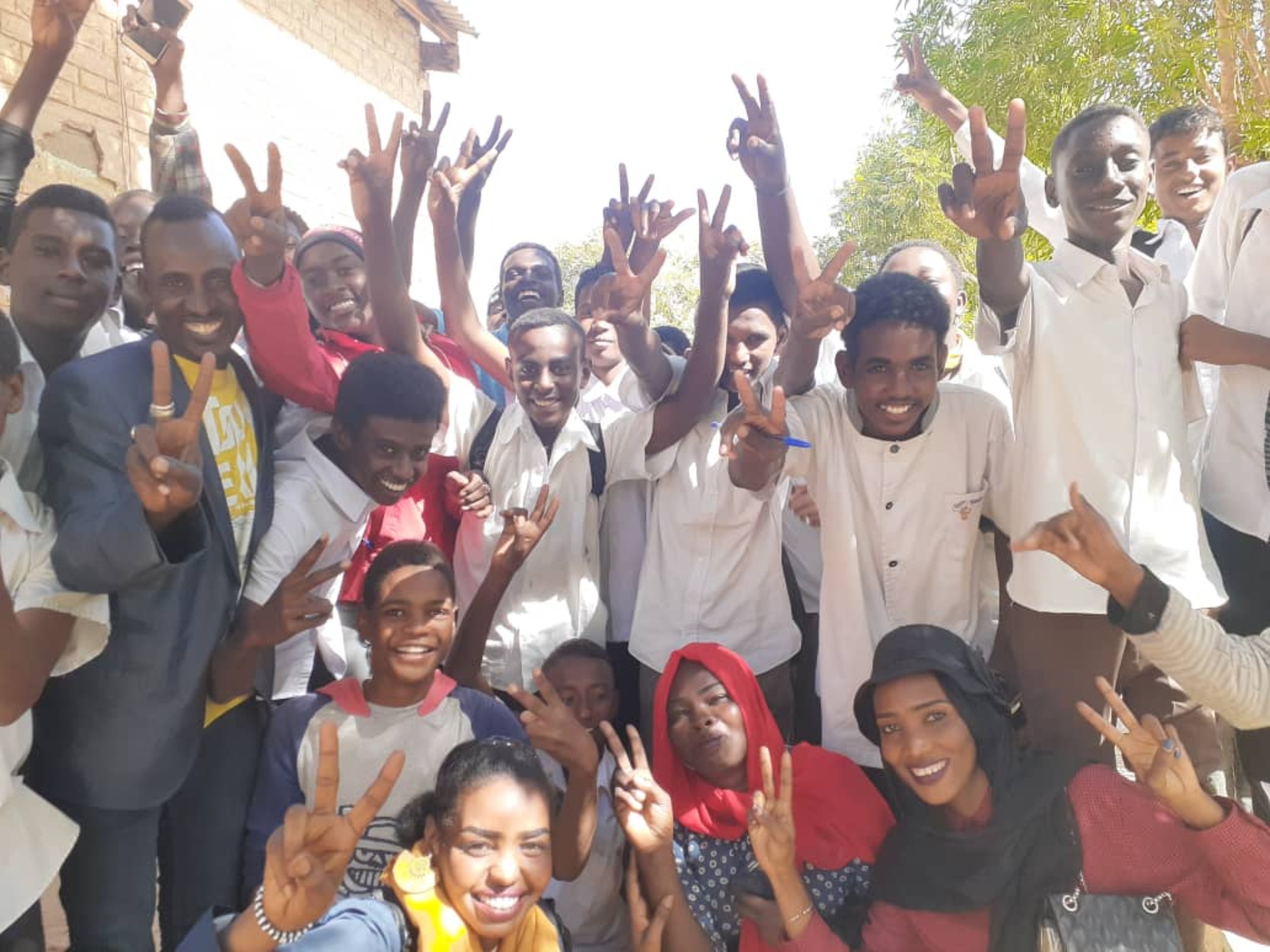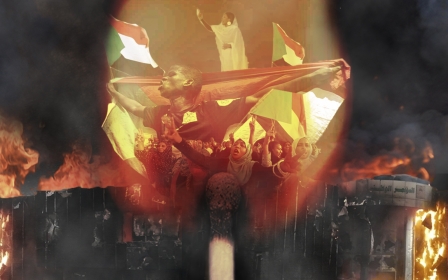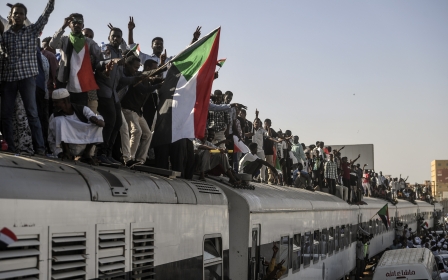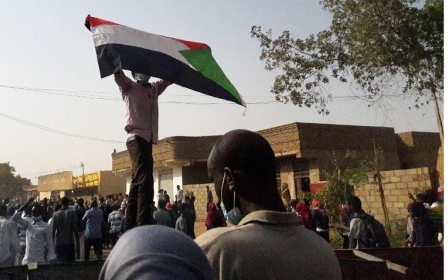Sudanese celebrate anniversary of uprising in 'capital of the struggle'
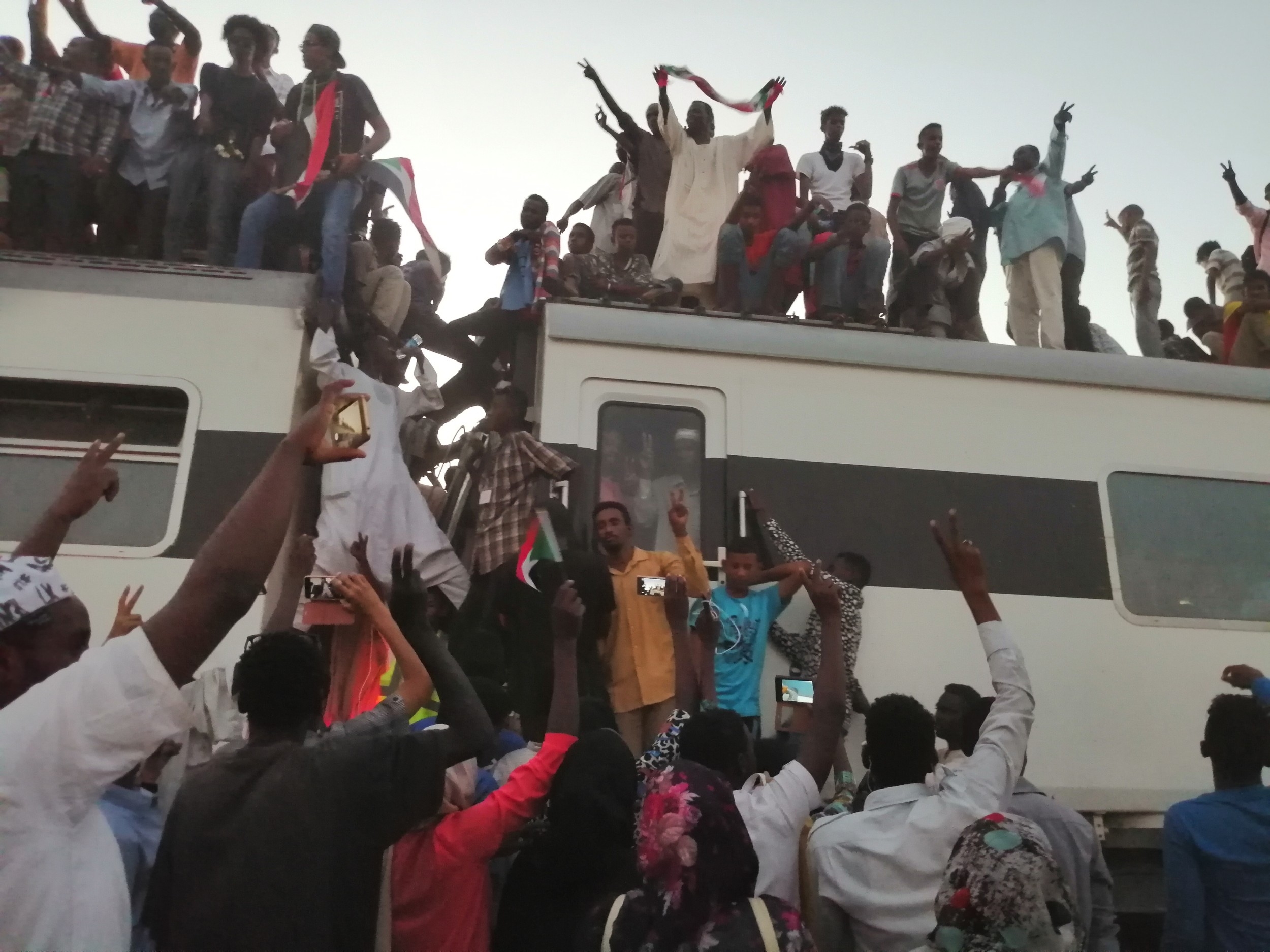
It all started with an upturned pot of beans.
Osama Abdul Gayoum remembers how on 18 December 2018 the then-17-year-old student and his friends headed to a restaurant in the north Sudan city of Atbara for breakfast, only to find out that there was no bread and the price of sandwiches had doubled.
"We were so angry," Ahmed Mohamed, one of Osama’s friends, told Middle East Eye. "Osama was the first to express his anger by kicking the big pot of foul beans to the ground, causing chaos in the entire market."
"The anger immediately became a big protest as hundreds of people joined us, and that was the beginning of the uprising," Ahmed added.
One year ago, the Sudanese government of President Omar Bashir ruled to strip subsidies on basic commodities.
New MEE newsletter: Jerusalem Dispatch
Sign up to get the latest insights and analysis on Israel-Palestine, alongside Turkey Unpacked and other MEE newsletters
The cost of bread tripled, sparking anger among Sudanese citizens that would ignite a mass popular movement which would eventually unseat Bashir after 30 years of iron rule in April.
On Thursday, Sudanese gathered in Atbara, the city where it all began, to commemorate the first anniversary of the beginning of the historical movement.
Like it was yesterday
While Osama’s outburst took place on 18 December 2018, it was only the next day that demonstrations began in Atbara in earnest.
On 19 December, thousands of people took to the streets to denounce the "bread crisis" and the soaring prices at the local market.
Mohammed al-Taybeh, a 22-year-old activist who participated in that day’s protest, told MEE about the moment when Atbara demonstrators defiantly burned down the local headquarters of Bashir's National Congress Party (NCP) - a symbolic moment that helped spread the uprising across the country.
'The slogans of the revolution - freedom, peace and justice - began in the Atbara market'
- Mohammed al-Taybeh, activist
"I saw the headquarters of the ruling party in the city burn down with my own eyes, despite the intense firing of live bullets, the death of three people and injury of others," he said. "The people also burnt down the headquarters of the municipality and destroyed the buildings of the zakat (Islamic tax), the Faisal Bank, and other symbols of the Islamic regime.
"The demands of the pro-democracy protesters were clear from the beginning,” Taybeh added. “The slogans of the revolution - freedom, peace and justice - began in the Atbara market."
Hamza Mohamed, a 40-year-old farmer, said he joined the demonstrations on 20 December, when thousands of residents from the town of Berber travelled 50 kilometres south to Atbara.
"I remembered every moment like it only just happened. Thousands of people from all the cities and villages along the Nile river had burnt down the offices of the ruling party and joined the people of Atbara despite the mass violence used by police and security forces," he told MEE.
Anniversary in the 'capital of the struggle'
December 2018 wasn’t the first uprising to be born in Atbara.
A cosmopolitan city of more than 100,000 inhabitants, Atbara is known as the city of iron and fire, due to its longstanding position as a railroad centre connecting different parts of the country.
The prominent role of railway labour in Atbara - and, consequently, workers’ organisations - contributed to the city's leading role in the 1985 and 1964 uprisings against the rule of the army.
"Atbara began the biggest protests against British colonialism in 1946," Altayeb al-Hussein, a 65-year-old former railway labourer, told MEE, adding that since Bashir came to power, "the people of Atbara have witnessed unusual oppression, as thousands of people have been dismissed from the railway corporation where the majority of Atbara’s people work, causing misery and poverty in the city in the past three decades."
Atbara's history and its recent role in the latest uprising inspired thousands of Sudanese youth, resistance committees and other pro-democracy protesters to travel on Thursday to commemorate the anniversary of the revolution in the "capital of the struggle".
Trains coming from cities like Khartoum, Port Sudan and Kosti brought in crowds to Atbara in a welcome reminder of the trains filled with demonstrators who left Atbara in April to join a vast sit-in in the capital.
Others used cars and other means of public transportation to reach Atbara from the towns of Kassala; Medani; Barbar; Eldamar; Abu Hamad; Karima; and Dongola, located across the country.
The city was decked in graffiti, flags and images of slain protesters, as residents welcomed out-of-towners at the Atbara railway station, with some locals offering up their homes as hotels and guest houses as the city reached full capacity.
In a festival atmosphere, the joyous crowd sang national songs, raised signs, and chanted the slogan of the revolution: “Freedom, Peace and Justice”.
An opportunity for reflection
Badr Hussein, one of the organisers of Thursday’s festival, told MEE there was particular symbolism in celebrating the anniversary in Atbara, inspiring a more radical push for change and bringing pride to the city’s residents.
"We are happy to receive all those people," the 35-year-old activist said. "Atbara today is the real heart of Sudan after long-standing neglect and exclusion by the old regime."
'Atbara today is the real heart of Sudan'
- Badr Hussein, Atbara activist
Another organiser, Elfatih Wad al-Bieh, 50, said Atbara showed another face of the revolution, far from official celebrations in Khartoum.
For Bieh, the anniversary provides an opportunity to assess the achievements and the failures of the revolution.
"It's also a chance for the heart of the revolution represented by the resistance committees to meet here in Atbara in order to organise themselves to further the revolution socially and economically," he said.
For Nigood al-Shalay, the secretary-general of the Sudanese Women’s Union in the River Nile state, Thursday's march in Atbara stood as a strong reply to a demonstration only a few days earlier by supporters of Bashir.
"We are here to send a strong message to pro-Bashir protesters who came to the streets in Khartoum a few days ago," she said. "Their control of the country is over."
Middle East Eye delivers independent and unrivalled coverage and analysis of the Middle East, North Africa and beyond. To learn more about republishing this content and the associated fees, please fill out this form. More about MEE can be found here.


